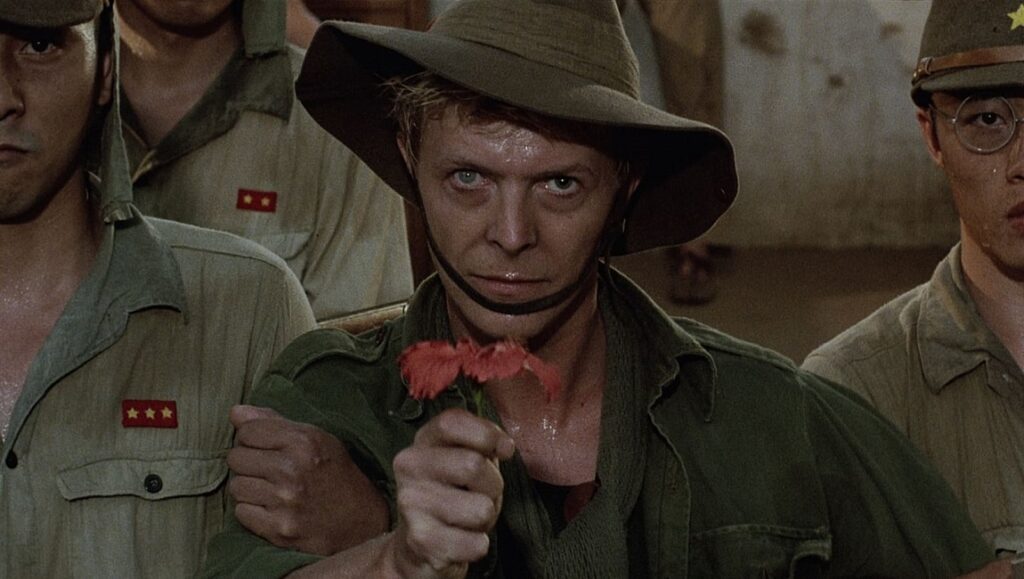At first glance, Merry Christmas, Mr. Lawrence seems to exist in opposition to its creator’s body of work. Directed and co-written by Nagisa Ôshima, an icon of the Japanese New Wave — a movement which also included Toshio Matsumoto, Shôhei Imamura, and Seijun Suzuki — the film contains little of the formal experimentation, transgressive subject matter, or political radicalism that had defined the director’s oeuvre up to that point. His most controversial work, 1976’s In the Realm of the Senses, notoriously included unsimulated sex acts between Eiko Matsuda and Tatsuya Fuji, while 1969’s Death by Hanging was a treatise on guilt, racism, and the death penalty which made use of the Brechtian Verfremdungseffekt.
Merry Christmas, Mr. Lawrence, on the other hand, has found resonance mainly as a plea for tolerance and understanding — worlds removed from the incendiary, leftist punctum visus Ôshima has been generally associated with. Indeed, the filmmaker tells the story of Maj. Jack Celliers (David Bowie) as he arrives at a Japanese POW camp during World War II, with minimal formal embellishments and with a surprising — shocking, some might say — amount of Oscar-friendly sentimentalism. Where one could perhaps expect to find provocative displays of sexuality, Ôshima opts for shots that linger on the character’s faces; where there would otherwise be bitingly satirical denunciations of Imperial Japan and the British Empire, there is broad, non-confrontational humanism (“We were all wrong,” says Takeshi Kitano’s Sgt. Gengo Hara about the war during the film’s final moments).
All of this becomes less shocking, however, when one considers the admiration Ôshima had for the likes of John Ford and Frank Capra — he lauded their “faith in humanity” — and he was certainly not immune to influence from both his forebears and contemporaries: Boy (1969) transplanted the shôshimin-eiga of Yasujirô Ozu to a Lumpenproletariat family scamming their way from meal to meal (Ôshima would likely scoff at the comparison, given his dislike of Japan’s cinematic old guard), while Night and Fog in Japan (1960) took it’s title and labyrinthine complex of ideas — both formal and philosophical — from Alain Resnais’ 1956 Holocaust documentary Night and Fog and Last Year at Marienbad (1961), respectively.
Likewise, the director’s political orthodoxy is regularly overstated — the result of reductive readings of his work, especially of Death by Hanging, which, in the minds of many, has been flattened into a one-dimensional anti-capital punishment tract — and ignores the bitter critique he reserved for much of Japan’s post-war left. It’s a trait Ôshima shared with In the Realm of the Senses producer and co-writer Kôji Wakamatsu, whose 1972 pink film Ecstasy of the Angels chronicled a revolutionary group’s descent into infighting, sexual assault, and betrayal, unflinching depictions of rape and violence included.
With Merry Christmas, Ôshima addends a more accessible approach with his aching portrayal of gay longing: Celliers’ strength of character impresses the repressed Capt. Yonoi (Ryuichi Sakamoto, who sadly passed away earlier this year and also provided the film’s gorgeous score), the camp’s commander, and Yonoi’s strange fixation develops into a quasi-romantic obsession with the magnetic British soldier. Bowie’s fierce, heterochromatic gaze and gentlemanly rebelliousness play captivatingly against Sakamoto’s honor-bound but barely-together constitution. This dynamic constitutes the film’s beating heart, and cinematographer Tôichirô Narushima’s lens captures some of the most beautiful and tender face acting ever filmed, elevated by Ôshima’s preference for sustained shots and push-ins over frequent cuts.
The more traditional sensibility isn’t always a perfect fit for the director, as evidenced by his reliance on an inelegant episodic structure — the film regularly fades to black, reminiscent of the way television movies are edited to account for commercial breaks — as well as his decision to frequently sideline the Celliers-Yonoi relationship in favor of exploring the far less interesting culture clash themes, brought up in the context of the unusual friendship between the titular Lt. Col. John Lawrence (Tom Conti) and Sgt. Hara. Though superbly acted — this was Kitano’s first departure from his comedic Beat Takeshi persona and his on-screen appearance was reportedly greeted with laughter from some Japanese audiences — their relationship pales beside the pained and emotionally complex connection shared by their co-stars, an extraordinarily touching final interaction notwithstanding.
The film does tie into Ôshima’s career-long interest in desire, specifically the kind that exists in opposition to social norms. His 1999 swan song Gohatto (a.k.a. Taboo) explored gay desire in the context of a Shogun-era samurai compound, but, like In the Realm of the Senses, was also concerned with the symbiotic relationship between desire, love, violence, and liberation. Merry Christmas, Mr. Lawrence, by contrast, leaves us with something different: a warm conversation between men who refuse to see each other as enemies, punishments not doled out, a kiss on the cheek — tiny gestures of humanity amidst the consuming death and destruction of war. The violence and hatred are prone to return, but nevertheless there is a powerful optimism to the film’s final shot: Hara, facing execution for his wartime deeds, bidding a final farewell to Lawrence (“Merry Christmas, Mr. Lawrence!”), smiling warmly as the frame freezes on his face.
Part of Kicking the Canon — The Film Canon.
Enjoy our content? Want early access to features, interviews, and more? Support us on Patreon!


Comments are closed.